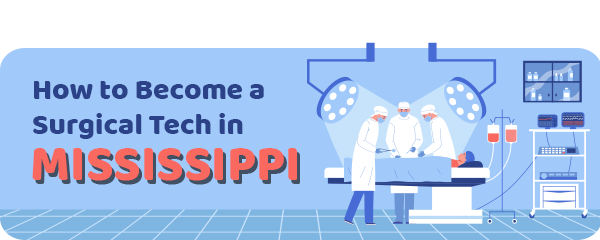Mississippi is home to a dedicated team of healthcare professionals working in surgical settings, and they play a vital role in ensuring the success of surgical procedures.
The surgical team consists of various specialists, including surgeons, anesthesia experts, surgical nurses, and surgical technicians.
These last professionals are often referred to by different titles, such as operation room (OR) techs and scrub techs.
Their collaboration begins before the operation commences and extends beyond its conclusion.
Article Table of Contents
Surgical Technologist Job Description and Duties
The role of a surgical technologist involves a variety of responsibilities during their work shifts, which include:
- Preparing patients for surgery
- Transporting patients to and from the OR
- Preparing the OR with surgical equipment and supplies
- Monitoring the instrument count throughout surgery
- Handing the surgeon medical instruments
- Closing wounds and bandaging patients
It’s essential to note that these duties are not exhaustive, as the role of a surgical technologist encompasses a broader spectrum of responsibilities.
Surgical Technologist Training and Education in Mississippi
Prospective surgical technologists in Mississippi initiate their journey by graduating from high school or obtaining a GED.
Their next step involves enrolling in a specialized training program tailored to this occupation.
While there is no specific institutional jurisdiction, students should seek comprehensive education and clinical training.
Several institutions offer such training across Mississippi, each with slightly varying enrollment requirements but common core classes:
- Microbiology,
- Pathophysiology,
- Pharmacology,
- Anatomy,
- Physiology,
- Medical terminology.
- CPR and/or BLS and/or AED
Prominent institutions providing surgical technology training in Mississippi include:
Bevill State Community College 
This program covers topics such as sterile processing, infection control, sterilization, instrumentation identification, and safety.
Admission prerequisites may include having a high school diploma or GED, passing the Accuplacer placement exam, and possibly having previous medical-related experience.
Completing at least 120 clinical cases is required, with at least 30 cases in General Surgery, 20 of which should be in the first scrub role.
Admission may also require meeting specific ACT scores, Accuplacer scores, or course prerequisites.
The program comprises 29 credits.
Calhoun Community College 
This college’s training program has a duration of around two years or four semesters, incorporating classroom, lab, and clinical instruction.
If you aim to earn an AAS at this college, you’ll need to complete an additional 18 general education credit hours.
To be accepted into the program, you must apply online, attend a program information session, complete a Manual Dexterity Exam, and meet the college’s admission requirements.
Meridian Community College 
Meridian Community College offers a one-year surgical technology certificate program spanning three semesters.
At the end of the summer semester, students receive a certificate.
The first semester focuses on classroom instruction, while the final two semesters involve clinical labs.
To progress to the next semester, students must successfully pass a skills test at the end of the first semester.
Upon program completion, students will be well-prepared to undertake the national certification exam, which is administered at the Meridian CC campus.
Pearl River Community College 
At Pearl River Community College, prospective students have the option to select either:
- A one-year surgical technologist technical certificate program
- A two-year Associate in Applied Science (AAS) degree program in surgical technology.
Admission to this program requires a minimum ACT score of 16.
To graduate from either program, students are required to actively participate in a minimum of 120 surgical cases during their clinical training.
The certificate program spans 46 credit hours distributed over three semesters, while the AAS degree program encompasses 65 credit hours.
In addition to the coursework included in the certificate program, students pursuing an AAS in surgical technology must complete courses in:
- Anatomy & Physiology
- Math/Natural Science elective
- Social/Behavior Science elective
- Humanities/Fine Arts elective
Class sizes are limited to 20 students.
Mississippi Gulf Coast Community College 
Mississippi Gulf Coast Community College provides an AAS degree program in surgical technology, consisting of 64 credit hours and achievable within two years.
Students in this program engage in regular classroom instruction and participate in clinical labs within the on-campus operating suite.
Prior to commencing program-specific courses, students must complete general education prerequisites
These include:
- Anatomy and Physiology 1 and 2
- Public Speaking
- English Composition
- College Algebra
- General Psychology
- Humanities/Fine Arts elective
| School Name | Address |
|---|---|
| Bevill State Community College | online |
| Pearl River Community College | 101 Highway 11 North, Poplarville, MS 39470 |
| Calhoun Community College | online |
| Mississippi Gulf Coast Community College | 51 Main St, Perkinston, MS 39573 |
| Meridian Community College | 910 Highway 19 N, Meridian, MS 39307 |
Becoming a Certified Surgical Technologist in Mississippi
While certification is not legally mandated, many employers in Mississippi prefer certified surgical technologists.
Various certifying bodies offer recognition in this field, including:
- National Surgical Assistant Association (NSAA)
- Provides the Certified Surgical Assistant (CSA) qualification
- National Board of Surgical Technology and Surgical Assisting (NBSTSA)
- Provides the Certified Surgical Technologist/Certified First Assistant credential
- National Center for Competency Training (NCCT)
- Provides the Tech in Surgery Certification
The NBSTSA certification holds the most national recognition.
The certification exam comprises 200 questions, with a passing threshold of 119 correct answers.
The associated exam fee varies based on membership status.
Certification renewal, required every four years, can be achieved through either retaking the exam or completing continuing education requirements, along with a renewal fee.
Surgical Technologist Salary in Mississippi
Surgical technologists play a crucial role in the healthcare system, and this is reflected in their salaries.
In Mississippi, the average annual income for an operating room technician is approximately $45,900.
Some cities in Mississippi offer the potential for higher salaries compared to other regions.
Annual Salary Range:| Location | Avg. Annual Salary |
|---|---|
| Olive Branch | $47,500 |
| Abbeville | $47,300 |
| Waterford | $47,300 |
| Victoria | $47,300 |
| Sibley | $46,600 |
| Tougaloo | $46,100 |
| Whitfield | $46,000 |
| Silver Creek | $45,600 |
| Benoit | $45,300 |
| Belmont | $44,000 |
Regional Salary in Mississippi
| Region | Employed | Avg. Annual Salary | Avg. Hourly Pay | Top 10% Annual Salary | Bottom 10% Annual Salary |
|---|---|---|---|---|---|
| Gulfport-Biloxi-Pascagoula, MS | 90 | $44,190 | $21.24 | $57,440 | $37,100 |
| Hattiesburg, MS | 150 | $51,670 | $24.84 | $60,480 | $39,880 |
| Jackson, MS | 370 | $50,440 | $24.25 | $61,760 | $38,710 |
* Employment conditions in your area may vary.
Frequently Asked Questions
What Sills Do I Need To Work As A Surgical Tech in Alabama?
Here are the most important skills this profession requires:
- Able to work as part of a team
- Detail-oriented
- Take direction
- Understanding medical terms
- Understanding medical methodology
- Good communication skills
Where Do Surgical Technologists from Alabama Find Work?
These technologists usually work in a hospital’s surgery wing.
Furthermore, these other places also hire such specialists:
- Children’s hospitals
- Cosmetic surgery centers
- Specialty clinics for surgical procedures
Can a Surgical Tech From Alabama Choose a Specialty?
YES!
Just like surgeons can choose to operate on a specific body part, so can these techs.
Here are the most commonly chosen surgery niches:
- General surgery,
- Ob/gyn,
- Urology,
- Plastics,
- Neurology
Read the full guide: How to Become a Surgical Technologist





